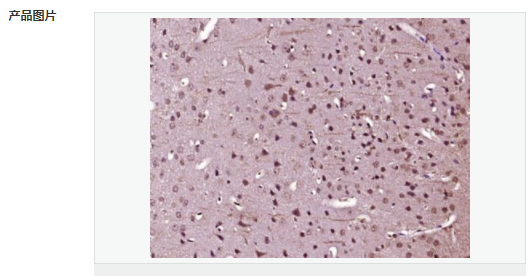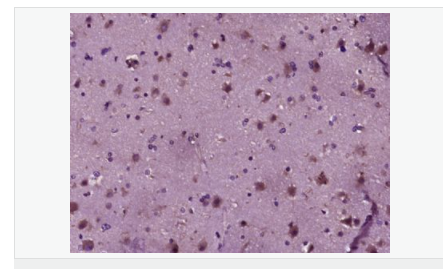

货号
产品规格
售价
备注
BN41252R-100ul
100ul
¥2360.00
交叉反应:Human,Mouse(predicted:Rat,Dog,Pig,Cow,Rabbit,Sheep) 推荐应用:IHC-P,ELISA
BN41252R-200ul
200ul
¥3490.00
交叉反应:Human,Mouse(predicted:Rat,Dog,Pig,Cow,Rabbit,Sheep) 推荐应用:IHC-P,ELISA
产品描述
| 英文名称 | PRKACA |
| 中文名称 | 蛋白激酶A催化亚基抗体 |
| 别 名 | cAMP Protein Kinase Catalytic subunit; cAMP dependent protein kinase alpha catalytic subunit; cAMP dependent protein kinase beta catalytic subunit; cAMP dependent protein kinase catalytic beta subunit isoform 4ab; cAMP dependent protein kinase catalytic subunit alpha; cAMP dependent protein kinase catalytic subunit alpha, isoform 1; cAMP dependent protein kinase catalytic subunit beta; DKFZp781I2452; MGC102831; MGC41879; MGC48865; MGC9320; PKA C alpha; PKA C beta; PKACA; PKACB; PRKACB; Protein kinase A catalytic subunit alpha; Protein kinase A catalytic subunit; Protein kinase A catalytic subunit beta; Protein kinase cAMP dependent catalytic alpha; Protein kinase cAMP dependent catalytic beta; Protein kinase, cAMP dependent, catalytic, alpha; Protein kinase, cAMP dependent, catalytic, beta. |
| 研究领域 | 肿瘤 细胞生物 信号转导 激酶和磷酸酶 |
| 抗体来源 | Rabbit |
| 克隆类型 | Polyclonal |
| 交叉反应 | Human, Mouse, (predicted: Rat, Dog, Pig, Cow, Rabbit, Sheep, ) |
| 产品应用 | ELISA=1:5000-10000 IHC-P=1:100-500 (石蜡切片需做抗原修复) not yet tested in other applications. optimal dilutions/concentrations should be determined by the end user. |
| 分 子 量 | 40kDa |
| 细胞定位 | 细胞核 细胞浆 |
| 性 状 | Liquid |
| 浓 度 | 1mg/ml |
| 免 疫 原 | KLH conjugated synthetic peptide derived from human cAMP Protein Kinase Catalytic subunit:1-100/351 |
| 亚 型 | IgG |
| 纯化方法 | affinity purified by Protein A |
| 储 存 液 | 0.01M TBS(pH7.4) with 1% BSA, 0.03% Proclin300 and 50% Glycerol. |
| 保存条件 | Shipped at 4℃. Store at -20 °C for one year. Avoid repeated freeze/thaw cycles. |
| PubMed | PubMed |
| 产品介绍 | This gene encodes one of the catalytic subunits of protein kinase A, which exists as a tetrameric holoenzyme with two regulatory subunits and two catalytic subunits, in its inactive form. cAMP causes the dissociation of the inactive holoenzyme into a dimer of regulatory subunits bound to four cAMP and two free monomeric catalytic subunits. Four different regulatory subunits and three catalytic subunits have been identified in humans. cAMP-dependent phosphorylation of proteins by protein kinase A is important to many cellular processes, including differentiation, proliferation, and apoptosis. Constitutive activation of this gene caused either by somatic mutations, or genomic duplications of regions that include this gene, have been associated with hyperplasias and adenomas of the adrenal cortex and are linked to corticotropin-independent Cushing's syndrome. Alternative splicing results in multiple transcript variants encoding different isoforms. Tissue-specific isoforms that differ at the N-terminus have been described, and these isoforms may differ in the post-translational modifications that occur at the N-terminus of some isoforms. [provided by RefSeq, Jan 2015] Function: CREB, SMAD6 and PKD1 and has multiple functions in cellular differentiation and epithelial morphogenesis. Regulates myeloid cell differentiation through SMAD6 phosphorylation. Involved in nephrogenesis by stimulating renal epithelial cell migration and tubulogenesis. Also involved in angiogenesis through stimulation of endothelial cell proliferation, migration and vascular-like structure formation Subunit: Like other cAMP-dependent protein kinases, the inactive holoenzyme is probably composed of 2 PRKX catalytic subunits and a dimer of regulatory subunits. Interacts (cAMP-dependent) specifically with the regulatory subunits PRKAR1A and PRKAR1B. Compared to other cAMP-dependent serine/threonine protein kinases, does not interact with the 2 other PKA regulatory subunits PRKAR2A and PRKAR2B. Interacts with cAMP-dependent protein kinase inhibitor/PKI proteins; inhibits PRKX. Interacts with GPKOW. Interacts with SMAD6. Interacts with PKD1; involved in differentiation and controlled morphogenesis of the kidney. Interacts with PIN1 (via WW domain). Subcellular Location: Cytoplasmic and Nuclear Tissue Specificity: Widely expressed (at protein level). Specifically expressed in blood by macrophages and granulocytes according to PubMed:9860982. Post-translational modifications: Phosphorylated; autophosphorylates in vitro. DISEASE: A chromosomal aberration involving PRKX is a cause of sex reversal disorder. Translocation t(X;Y)(p22;p11) with PRKY. Chromosomal translocations proximal to PRKY account for about 30% of the cases of sex reversal disorder in XX males and XY females. Similarity: Belongs to the protein kinase superfamily. AGC Ser/Thr protein kinase family. cAMP subfamily. SWISS: P17612 Gene ID: 5566 Database links: Entrez Gene: 5566 Human Entrez Gene: 18747 Mouse Omim: 601639 Human SwissProt: P17612 Human SwissProt: P05132 Mouse Unigene: 631630 Human Unigene: 19111 Mouse Unigene: 20 Rat Important Note: This product as supplied is intended for research use only, not for use in human, therapeutic or diagnostic applications. |

